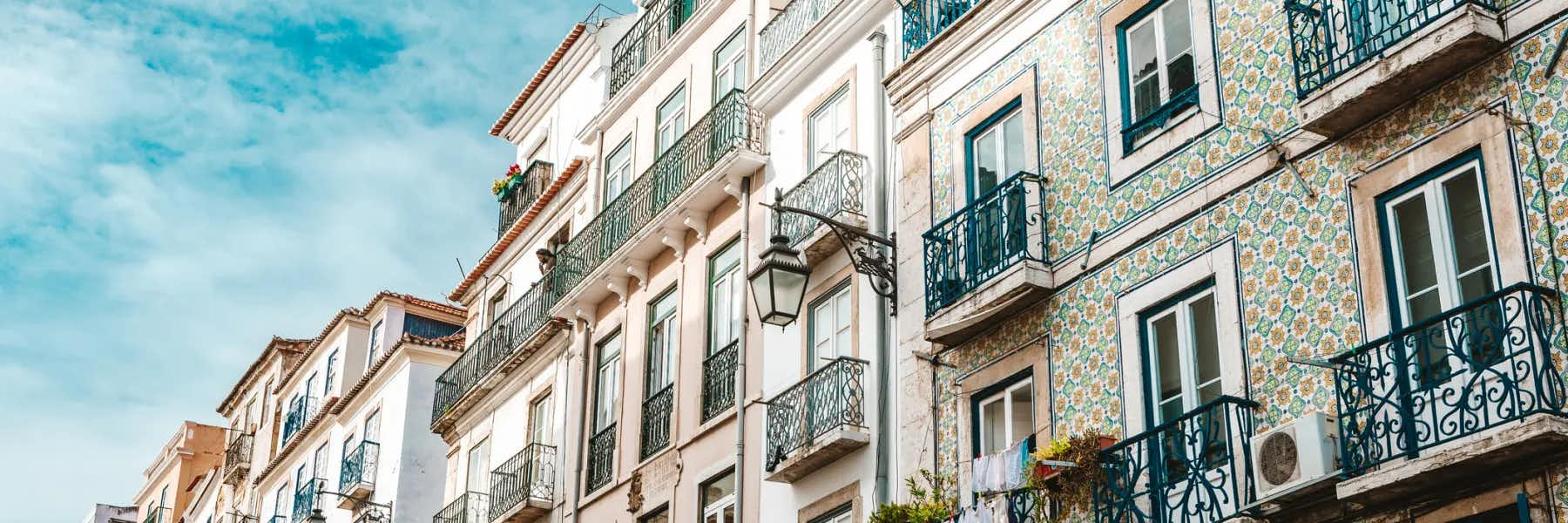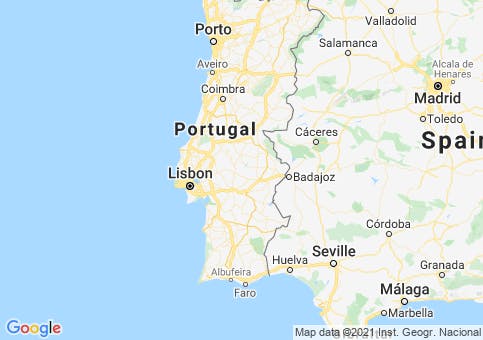Portugal is fast becoming a favorite destination amongst North Americans seeking to live in one of the safest countries in the world, with affordable, exemplary healthcare, reliable infrastructure, a healthy lifestyle, and a low cost of living. There’s no fear of gun violence in Portugal, as guns are only permitted for hunting, never for self-defense, and come with an extensive list of police-issued regulations.
You can kiss snow and sleet-filled days goodbye as you embrace Portugal’s moderate year-round climate. Winter and spring rains create lush, green landscapes, fields of vibrant wildflowers, and succulent, locally grown fruit and vegetables. Sunshine is abundant year-round, especially in the southern part of the country, where winters bring far less rain and drier, hot summers.
Vibrant cities like Lisbon and Porto offer residents a buzzing nightlife, a plenitude of museums, cultural events, concerts, gastronomy, and public transport options. Seaside havens in the Algarve offer turquoise water perfectly decorated with towering cliffs and supple white sand. Historic, cobbled villages feature narrow lanes, ruined castles, and a café culture permeated by the sweet smells of coffee and pastries.
Life in Portugal is relaxed and easy-going, where you can sit and sip wine with friends for hours, or nurse the same cup of coffee all morning and never be asked to leave the café.
The Portuguese people are warm and welcoming to foreigners, and accept everyone with open arms. Expats from North America, the rest of Europe, Africa, the United Kingdom, Brazil, Asia, India, and elsewhere call this tiny country home, so everyone fits in.
Unlike other European countries, exchanging your U.S. or Canadian driver's license is a straightforward process with no need to retake the test, practical or written, in Portuguese.
Culture
The Portuguese are all about family, taking the time to embrace their older family members, spending time with their children, and enjoying life together. Young women typically live with their parents until they are close to age 30 or get married. Elder parents are cared for by their grown children, often residing in the same home.
Lunchtime in Portugal can be long, relaxed and usually includes wine. A typical meal begins with a bowl of pureed vegetable soup, followed by an entrée of fish, fries, and/or rice, ending with dessert and coffee. The Portuguese people love coffee, usually a tiny cup of stout espresso, and drink it throughout the day. Dinnertime in Portugal begins around 8 p.m. for the locals, often lasting several hours. It usually includes bread and olives as an entrée, the main course of fish or meat with optional side dishes, and plenty of wine or beer.
The Mediterranean diet is alive and encouraged in Portugal, with abundant fish and seafood supplies, olive oil, and fresh, affordable produce. Freshly baked bread can be picked up at bakeries on almost every corner, and it’s so delicious, you’ll surely find yourself addicted!
Many foreigners who live in Portugal need help to adapt to the slower pace of life. When doing business, it’s common to have to take a number and wait. Tiny machines offering senhas, or numbered tickets, can be found in bakeries, pharmacies, clinics, hospitals, post office, government offices, and more.
When searching for a property to rent or purchase, check for a heat source since central heating systems are rare in Portugal. Older homes might look charming but will often lack insulation and double-glazed windows, allowing moisture to seep through the walls and create mold. Air conditioner units that provide heat are the most energy efficient and keep the home dry and cozy.
To settle comfortably into life in Portugal, foreigners must come with plenty of patience and realize that although things might be different, it doesn’t mean they’re wrong. Just relax and go with the flow.
Language
Of course, Portuguese is the official language of Portugal, but many locals, especially the younger ones, speak English.
Cinemas run movies in their original languages throughout the country, often English, with Portuguese subtitles. Older television shows from the U.S. and Canada are also shown in English. The Portuguese people like it this way as it helps them to practice and learn more English, the global lingua franca.
Schools in Portugal teach English as a mandatory subject to all students starting at a young age.
But it’s highly recommended that foreigners learn Portuguese since it’s a sign of respect and will sometimes be needed. All legal documents are required to be written in Portuguese. Rental contracts, loan paperwork, mortgages, wills, car registration, and other documents will be in Portuguese, so knowing some of the language will greatly help in your daily life.
The Portuguese government offers FREE language lessons to foreigners. Classes are held at local high schools, starting at the A1 level through the B2 level. The A2 level is considered elementary, or a sixth-grade language level. These classes are designed for immigrants who come here to work, study, or live, and must be competent in their language skills. Classes run for five to eight months, are held two to three times per week, and culminate with a test.
Completing an A2 level of Portuguese is required for anyone wishing to apply for Portuguese citizenship after living in the country for five years or permanent residency status. Although these free classes are geared toward beginners, there is often NO English spoken from the beginning.
Many private teachers can be found in Portugal to learn the language one-on-one or in small group classes. Classes either meet in person or online. It’s important to learn European or Continental Portuguese and NOT the Brazilian form when learning Portuguese. Brazilian Portuguese is a very different language from the language spoken in Portugal.
Healthcare
Portugal has both a public and a private healthcare system, and all foreigners who become residents will have access to both. Although both healthcare systems are good, the two have distinct differences.
The private healthcare system offers the option to call, email, or make appointments online. Websites provide a complete list of specialties and providers with details of each physician’s language, the scope of their practice, and qualifications. Private hospitals offer patients private rooms, and triage units in the emergency department are similar to those found throughout the United States. Many physicians’ offices are located inside the hospital complex, while others have private practices elsewhere.
Costs to see a general practitioner or specialist range from €50 to €90 in the private system, and admission to a private hospital starts at €200 per day. Medications purchased at pharmacies cost less with a prescription, but some are available at a slightly higher cost without one.
To see a doctor in the public healthcare system, patients need to go to the clinic, take a number and wait to be seen by whatever doctor is there. There’s no choice of doctors in the public system, and there is no way to know whether or not a provider speaks English. Should a patient need to be admitted into a public hospital, they would be put into a triage unit lined with other beds while they wait to be moved into a ward with multiple beds and patients. The cost would be minimal, starting at around €7, to see a doctor in the clinic.
All foreigners must carry private health insurance for the duration of their temporary visa. Costs start at around €50 per person, and increase with age, pre-existing conditions, and the type of coverage. Plans typically have no deductible, but small co-pays do apply. A couple in their 60s with pre-existing conditions can expect to pay around €300 a month for a high-end plan with a €15 copay to see a doctor. A European Health Card can be picked up free from local social security offices and used for emergency care when traveling around Europe.
Larger cities like Lisbon, Porto, and Coimbra offer top-notch healthcare facilities where expats can be assured of receiving the best care. The popular expat havens in the Algarve also offer excellent private hospitals and clinics.
Smaller, rural towns and villages in Portugal may offer limited or no options for healthcare, just like living in some rural areas of the U.S. or Canada.
Community
Portugal has thousands of foreign expats who have settled into favored hot spots such as Lisbon, Porto, the Silver Coast, and the Algarve. Social media platforms like Facebook are ideal for connecting with like-minded people. Americans & Friends PT, has a “files” section with PDFs on all things pertaining to Portugal and offers a “search” feature for common questions.
Women Over 50 Moving to Portugal is based in Lisbon and offers a great way for single women to meet others. Other groups are Lisbon Digital Nomads & Expats, Expats in Lisbon, Porto Expats, Porto Expat Family, Expat Families with Kids Moving to and Living in Portugal, Silver Coast Our Home, Americans Living in the Algarve, and Algarve Expats. There are many more groups also.
Expats throughout Portugal meet for luncheons, yoga, walking, cycling, bowling, volunteering, language lessons, dances, art shows, and more. Staying active and making friends from all over the world in Portugal is easy and fun.
Meetups for expats are held in many cities and towns, such as Cascais, Lisbon, Caldas da Rainha, and in the Algarve towns of Tavira, Albufeira, Lagos, and Portimão.
Shopping in Portugal is great, with options ranging from mega-shopping malls to small mom-and-pop stores. Whatever can’t be found locally, can be purchased from Amazon Spain, Germany, or France; orders from Spain often arrive the next day. Seville, Spain has a huge Costco Warehouse store similar to something you’d find in the U.S., although some products may differ.
Work and Business
Portugal is a wonderful country to come to as a retiree, digital nomad, or to work remotely from a company in your home country. However, those who come to Portugal hoping to find work may be disappointed. The minimum wage in Portugal is low by U.S. standards, and currently is set at €760 per month. Available positions in Portugal must be offered first to Portuguese citizens, next to other Europeans, and then finally to foreigners. Being fluent in the language would also be necessary to secure employment, and English-only speakers may resort to jobs in call centers or waiting tables in tourist destinations.
Opening a business in Portugal starts with a business plan and a visit to a Portuguese accountant to discuss the tax obligations, labor laws, and other considerations before proceeding. It’s important to do your due diligence because even if the business fails, you could still be liable for paying for the help anyway. Here is a link to the government website for more information.











